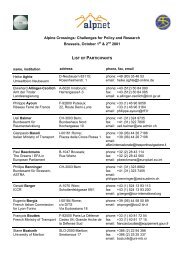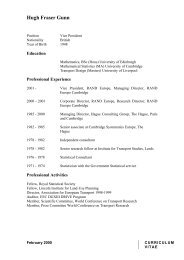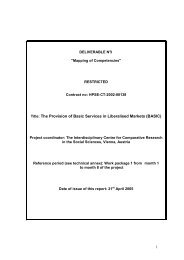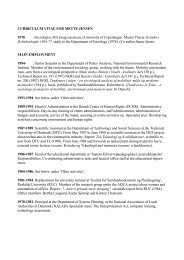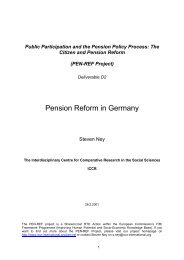The Housing Dimension of Welfare Reform - the ICCR
The Housing Dimension of Welfare Reform - the ICCR
The Housing Dimension of Welfare Reform - the ICCR
Create successful ePaper yourself
Turn your PDF publications into a flip-book with our unique Google optimized e-Paper software.
provide rent assistance to <strong>the</strong> poorest household. Renovation subsidies<br />
are also available.<br />
Since 1971 access criteria have become less rigid to include more groups<br />
in need, for instance, immigrants and young people, and are no longer<br />
restricted to mainly low income families. Eligibility is subject to income<br />
ceilings which are regionally defined within pre-given limits according to<br />
national legislation. In determining priorities, criteria such as family size,<br />
housing conditions, or having been evicted are taken into consideration.<br />
<strong>The</strong> regions may fur<strong>the</strong>rmore define and prioritise ‘special categories’.<br />
Recurrent are <strong>the</strong> elderly, young couples, emigrants returning to Italy, or<br />
large families.<br />
Traditionally, social housing tenants had <strong>the</strong> option to purchase <strong>the</strong>ir<br />
units based on a redemption formula. Recently, massive sale programmes<br />
have given tenants <strong>the</strong> right <strong>of</strong> first refusal. Family members may enter<br />
leases upon death <strong>of</strong> <strong>the</strong> head <strong>of</strong> household or, in case <strong>of</strong> legal separation,<br />
if evidence <strong>of</strong> kinship and minimum periods <strong>of</strong> residence is provided.<br />
<strong>The</strong> extent <strong>of</strong> tenant participation in management differs across regions.<br />
Self-administration includes minor maintenance responsibilities for<br />
common areas.<br />
Belgium displays a similarly small social housing sector. Of <strong>the</strong> rentals<br />
available (a third <strong>of</strong> <strong>the</strong> housing stock) less than a fifth are social rentals<br />
(five per cent <strong>of</strong> <strong>the</strong> total housing stock; eight per cent <strong>of</strong> <strong>the</strong> housing<br />
stock in <strong>the</strong> Brussels region). Rent amounts are adjusted to income and,<br />
toge<strong>the</strong>r with <strong>the</strong> more general social protection benefits, are expected to<br />
meet social needs without specific housing benefits such as rent<br />
subsidies. Despite <strong>the</strong> seemingly high proportion <strong>of</strong> GDP spent on<br />
housing <strong>the</strong> redistribution effect remains insignificant as tax rebates and<br />
subsidised loans form <strong>the</strong> major instruments. Such instruments are <strong>of</strong>ten<br />
not accessible to vulnerable low income groups.<br />
<strong>The</strong> social sector in Ireland is understood as aid to those unable to<br />
provide for housing <strong>the</strong>mselves. Social housing in Ireland is increasingly<br />
identical with low socio-economic status and long-term poverty,<br />
particularly in urban areas. Social housing provision has declined from<br />
more than 10 per cent in 1996 to 7 per cent in 1999. This contrasts with<br />
increased demand: due to rising housing prices social housing needs<br />
increased by 43 per cent over <strong>the</strong> three-year period from 1996 to 1999;<br />
29 per cent <strong>of</strong> those in need were private tenants.<br />
Social housing is financed by <strong>the</strong> federal budget. Non-statutory social<br />
housing providers receive funds via two schemes. One is based on capital<br />
loans and rent subsidies, <strong>the</strong> o<strong>the</strong>r on capital assistance for non-pr<strong>of</strong>it<br />
housing associations and voluntary organisations. Typically, private<br />
EUROHOME-IMPACT FINAL REPORT 27



